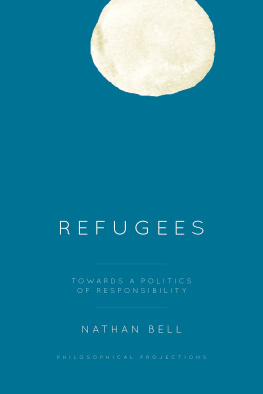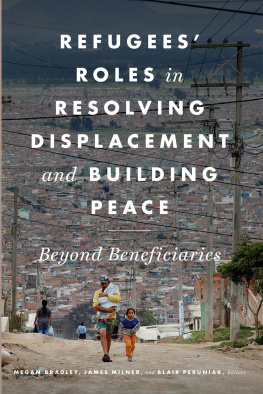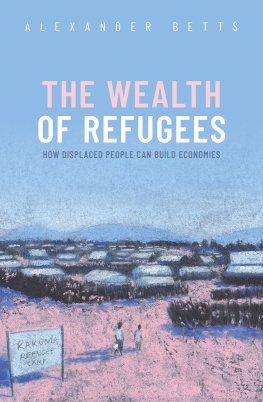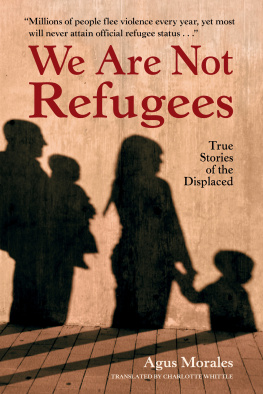Refugees
Philosophical Projections
Series Editor: Andrew Benjamin, Distinguished Professor of Philosophy and the Humanities, Kingston University, UK, and Professor of Philosophy and Jewish Thought, Monash University, Australia
Philosophical Projections represents the future of Modern European Philosophy. The series seeks to innovate by grounding the future in the work of the present, opening up the philosophical and allowing it to renew itself, while interrogating the continuity of the philosophical after the critique of metaphysics.
Titles in the Series
Foundations of the Everyday: Shock, Deferral, Repetition
Eran Dorfman
The Thought of Matter: Materialism, Conceptuality and the Transcendence of Immanence
Richard A. Lee
Nancy, Blanchot: A Serious Controversy
Leslie Hill
The Work of Forgetting: Or, How Can We Make the Future Possible?
Stephane Symons
Political Loneliness: Modern Liberal Subjects in Hiding
Jennifer Gaffney
Fraught Decisions in Plato and Shakespeare
Dianne Rothleder
Refugees: Towards a Politics of Responsibility
Nathan Bell
Refugees
Towards a Politics
of Responsibility
Nathan Bell
ROWMAN & LITTLEFIELD
Lanham Boulder New York London
Published by Rowman & Littlefield
An imprint of The Rowman & Littlefield Publishing Group, Inc.
4501 Forbes Boulevard, Suite 200, Lanham, Maryland 20706
www.rowman.com
6 Tinworth Street, London SE11 5AL, United Kingdom
Copyright 2021 by Nathan Bell
All rights reserved . No part of this book may be reproduced in any form or by any electronic or mechanical means, including information storage and retrieval systems, without written permission from the publisher, except by a reviewer who may quote passages in a review.
British Library Cataloguing in Publication Information Available
Library of Congress Cataloging-in-Publication Data
Names: Bell, Nathan (Lecturer), author.
Title: Refugees : towards a politics of responsibility / Nathan Bell.
Description: Lanham : Rowman & Littlefield, [2021] | Series: Philosophical projections | Includes bibliographical references and index.
Identifiers: LCCN 2020053263 (print) | LCCN 2020053264 (ebook) | ISBN 9781786614186 (cloth) | ISBN 9781786614209 (epub)
Subjects: LCSH: RefugeesGovernment policyMoral and ethical aspects. | RefugeesLegal status, laws, etc. | Government accountability. | Human rightsPhilosophy.
Classification: LCC JV6346 .B45 2021 (print) | LCC JV6346 (ebook) | DDC 172/.2dc23
LC record available at https://lccn.loc.gov/2020053263
LC ebook record available at https://lccn.loc.gov/2020053264
 The paper used in this publication meets the minimum requirements of American National Standard for Information SciencesPermanence of Paper for Printed Library Materials, ANSI/NISO Z39.48-1992.
The paper used in this publication meets the minimum requirements of American National Standard for Information SciencesPermanence of Paper for Printed Library Materials, ANSI/NISO Z39.48-1992.
Contents
I have many people colleagues and students, friends and family to thank for their support, encouragement, and provocations to thought over the ten-year period which I have dedicated (between my PhD, completed part-time, and the subsequent writing of this book) to the following question: how should the right to asylum be understood and acted upon?
I must start by thanking Professor Andrew Benjamin, whose generosity cannot be overstated. The present work reflects the constancy of a dialogue with Andrew that has been incredibly rewarding and challenging. His influence is virtually everywhere in the text that follows, and not only in those places where his work is explicitly engaged. This generosity is all the more remarkable for the fact that I was never his formally enrolled student testament to his pure dedication in supporting all those pursuing the life of the mind.
Similar thanks must be extended to the supervisors of my PhD and constant mentors over this past decade (and prior to that), Dr Michael Janover and Dr Paul Muldoon. Their gracious wisdom and gentle guidance, while at the same time always pushing me to clearer explication and challenging me where necessary, was invaluable. They have also given me my start in academic teaching, as both tutor and lecturer, and for that I will always be enormously grateful. I also want to thank my colleagues in the Philosophy Department at Monash University who have supported and challenged me in my growth as a philosopher. Particular thanks to those I have worked with the most these past years, Professor Robert Sparrow, Dr Robert Simpson, and Dr Suzy Killmister. Thanks are also owed to my former colleagues at CEVIPOF Sciences Po in Paris, where I spent a year and a half on scholarship during my PhD an experience which was essential in allowing me to work full-time on the project and to grow as a scholar.
Thanks also to my students, in human rights and political theory and political philosophy, who have been a joy to teach, and who have also taught me a great deal. It has been the honour of my career to have a role in the development of their intellectual journey. Also to those I have met at conferences at home and around the world, thank-you for your probing questions and insights; in particular, thanks to Richard Cohen and Jolanta Saldukaityte for having me at their annual Levinas seminar, and to Claire Higgins and other organizers for my membership and participation in the Kaldor Centre Emerging Scholars Network at UNSW. Thanks to Asher Hirsch for educating me on how the law works (or doesnt) in relation to asylum.
I must thank all those who read drafts of the chapters of this book and provided invaluable feedback: Johannes Bennke, Richard Cohen, Sue Hempel, James Kent, Suzy Killmister, Paul Muldoon, Robert Simpson, Rozemund Ulje, Michelle Boulous Walker. Special thanks to Valentin Cartillier who went above and beyond in reading multiple chapter drafts, and George Cox for both reading chapters and editing assistance. Michelle has also been a constant champion of the project, thanks for all your kindness and generosity Michelle!
Great thanks to Frankie Mace and Scarlet Furness at Rowman & Littlefield for their kind patience in tolerating my many delays in completion of the work. This book quickly outgrew the project of being a rewrite of my PhD, becoming an entirely new argument, which made finishing it on time difficult; their support has been very much appreciated. Thanks also to those who provided reader reports on the book proposal, especially Peg Birmingham whose comments were incredibly encouraging, and who indeed helped me to clarify exactly what I was seeking to articulate with this book. I wish also to extend my gratitude to the cover design team I find it elegant and evocative. My only request was that the colour be ocean blue, as a reflection of the dangerous sea journeys endured by so many. As Hans Blumenberg is quoted in the book, both progress and sinkings leave behind them the same peaceful surface. As will be seen, this theme of the invisible aspect of reality, of the calamities that hide beneath the calm exterior of all that is, can be understood as a central theme of the book. The cover makes me think also of accounts of sea crossings where all the lights on the boat are turned off to avoid detection, where the only light is literally the light of the moon.
In a more personal vein, thank you to my three sisters Jodie, Megan, and Laura for all their love and kindness. To my father David Bell for awakening my political instincts in a progressive direction and for all our conversations about politics over the years. To my late Grandparents Bill and Joan Bell, who were always kind to me. To Kath, Seb, Josh and Sarah; to my aunts and uncles and cousins on both sides of the family, thanks for your love and support. To Martin and the Harkess family for all their support. To my best friend James Townsend, my constant brother-in-arms through all these years, and to Peter Newbigin, who is trying to make the world a better place in his development work around the world (Robinsons Attack!).













 The paper used in this publication meets the minimum requirements of American National Standard for Information SciencesPermanence of Paper for Printed Library Materials, ANSI/NISO Z39.48-1992.
The paper used in this publication meets the minimum requirements of American National Standard for Information SciencesPermanence of Paper for Printed Library Materials, ANSI/NISO Z39.48-1992.